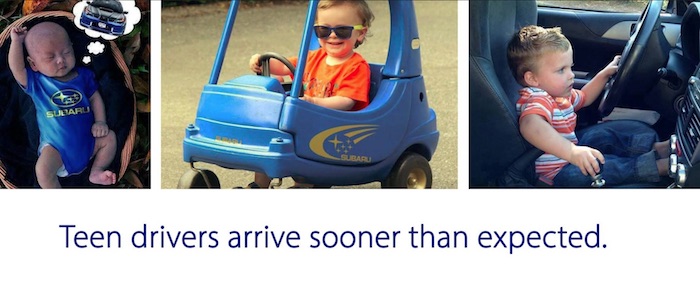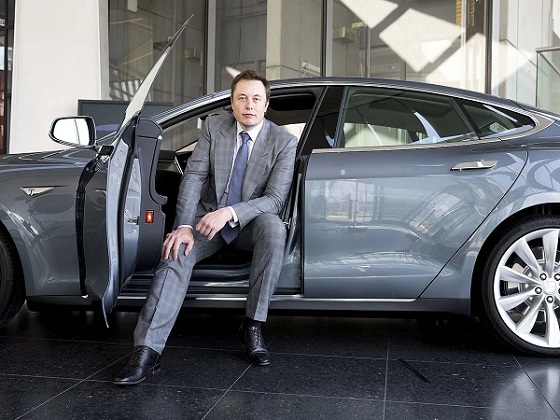Automotive
Eight safe and reliable Subaru Models you should consider for your teen driver

Eight Subaru Models Recommended for Teen Drivers
As a parent, I vividly remember the day I held my child in my arms for the first time, overwhelmed with a mixture of joy, love, and a touch of anxiety about the future. Little did I know that time would pass in the blink of an eye, and before I knew it, my child would be eagerly waiting to obtain their driver’s license. It’s remarkable how fast they grow up. When it comes to selecting a car for a teen driver, safety and reliability become paramount concerns for us as parents. This is where Subaru shines, as a brand renowned for its unwavering dedication to safety and durability. In fact, among the vast array of Subaru models, there are eight standout vehicles that receive high recommendations for young drivers. These models include four in the new vehicle category and four in the used vehicle category, all achieving the coveted Best Choice rating. Join me as we delve into the details of eight Subaru models that are the perfect fit for our teen drivers.
Used Vehicle Category:
Subaru Impreza (2018MY, 2022MY): The Subaru Impreza is a compact car that offers excellent safety features, including all-wheel drive (AWD) and Subaru’s EyeSight driver-assist system. It has a reputation for reliability and comes in both sedan and hatchback variants, offering versatility and practicality.
Subaru Legacy (2013-2021MY; built after August 2012): The Subaru Legacy is a midsize sedan that combines safety, comfort, and durability. With its spacious interior and advanced safety technologies, such as adaptive cruise control and lane departure warning, the Legacy provides peace of mind for both parents and teen drivers.
Subaru Forester (2018MY or newer): As a compact SUV, the Subaru Forester offers a higher driving position and ample cargo space. Its symmetrical AWD system provides excellent traction, making it a reliable choice for teen drivers, especially in areas with challenging weather conditions.
Subaru Outback (2015-2018MY, 2022MY): The Subaru Outback is a versatile crossover that strikes a balance between ruggedness and comfort. It offers generous cargo capacity, advanced safety features, and a capable AWD system, making it an ideal choice for adventurous teens and families alike.
New Vehicle Category:
Subaru Legacy: A midsize sedan, the Legacy has earned its spot among the recommended new vehicles due to its exceptional safety record and overall performance. With its spacious and comfortable interior, advanced safety technologies, and reliable handling, the Legacy offers a balanced and enjoyable driving experience.
Subaru Outback: For those seeking a versatile and capable crossover, the Outback is an excellent choice. Boasting a spacious cabin, generous cargo capacity, and Subaru’s renowned symmetrical all-wheel drive system, the Outback provides a confident and safe ride on various road conditions.
Subaru Forester: A compact SUV, the Forester stands out as a recommended new vehicle due to its combination of practicality, safety, and reliability. With ample cargo space, excellent visibility, and advanced safety features, the Forester is well-suited for both daily commutes and weekend adventures.
Finally, the Subaru Ascent, a three-row SUV, has garnered accolades for its spaciousness, comfortable seating, and impressive safety features. With its refined interior, robust performance, and ample room for passengers and cargo, the Ascent offers families a reliable and enjoyable driving experience.
Subaru’s Commitment to Safety and Reliability:
Subaru has a strong reputation for producing vehicles that prioritize safety and reliability. In fact, Subaru has earned more Insurance Institute for Highway Safety (IIHS) Top Safety Pick+ awards than any other brand since 2013*. This recognition highlights Subaru’s dedication to building vehicles that offer the highest level of protection for drivers and passengers alike.
Furthermore, Consumer Reports consistently ranks Subaru as the best mainstream automotive brand, further reinforcing the brand’s commitment to quality and customer satisfaction. Subaru’s reputation for reliability makes it a wise choice for parents seeking a vehicle that will keep their teen drivers safe and secure.
In conclusion, when it comes to selecting a car for a teen driver, Subaru offers a wide range of models that excel in safety, reliability, and overall quality. With four models recommended in both the used and new vehicle categories, Subaru provides options that suit different preferences and budgets. By choosing a Subaru for your teen driver, you can have peace of mind knowing that they are behind the wheel of a vehicle that prioritizes their safety and well-being.
*Please note that the information regarding IIHS TSP+ awards is accurate as of the knowledge cutoff date in September 2021.
2025 Federal Election
Don’t let the Liberals fool you on electric cars

 Dan McTeague
Dan McTeague
“The Liberals, hoodwinked by the ideological (and false) narrative that EVs are better for the environment, want to force you to replace the car or truck you love with one you can’t afford which doesn’t do what you need it to do.”
The Liberals’ carbon tax ploy is utterly shameless. For years they’ve been telling us that the Carbon Tax was a hallmark of Canadian patriotism, that it was the best way to save the planet, that it was really a “price on pollution,” which would ultimately benefit the little guy, in the form of a rebate in which Canadians would get back all the money they paid in, and more!
Meanwhile big, faceless Captain Planet villain corporations — who are out there wrecking the planet for the sheer fun of it! — will shoulder the whole burden.
But then, as people started to feel the hit to their wallets and polling on the topic fell off a cliff, the Liberals’ newly anointed leader — the environmentalist fanatic Mark Carney — threw himself a Trumpian signing ceremony, at which he and the party (at least rhetorically) kicked the carbon tax to the curb and started patting themselves on the back for saving Canada from the foul beast. “Don’t ask where it came from,” they seem to be saying. “The point is, it’s gone.”
Of course, it’s not. The Consumer Carbon Tax has been zeroed out, at least for the moment, not repealed. Meanwhile, the Industrial Carbon Tax, on business and industry, is not only being left in place, it’s being talked up in exactly the same terms as the Consumer Tax was.
No matter that it will continue to go up at the same rate as the Consumer Tax would have, such that it will be indistinguishable from the Consumer Tax by 2030. And no matter that the burden of that tax will ultimately be passed down to working Canadians in the form of higher prices.
Of course, when that happens, Carney & Co will probably blame Donald Trump, rather than their own crooked tax regime.
Yes, it is shameless. But it also puts Pierre Poilievre and the Conservatives in a bind. They’ve been proclaiming their intention to “Axe the Tax” for quite some time now. On the energy file, it was pretty much all you could get them to talk about. So much so that I was worried that upon entering government, they might just go after the low hanging fruit, repeal the Carbon Tax, and move on to other things, leaving the rest of the rotten Net-Zero superstructure in place.
But now, since the Liberals beat them to it (or claim they did,) the Conservatives are left grasping for a straightforward, signature policy which they can use to differentiate themselves from their opponents.
Poilievre’s recently announced intention to kill the Industrial Carbon Tax is welcome, especially at a time when Canadian business is under a tariff threat from both the U.S. and China. But that requires some explanation, and as the old political saying goes, “If you’re explaining, you’re losing.”
There is one policy change however, which comes to mind as a potential replacement. It’s bold, it would make the lives of Canadians materially better, and it’s so deeply interwoven with the “Green” grift of the environmentalist movement of which Mark Carney is so much a part that his party couldn’t possibly bring themselves to steal it.
Pierre Poilievre should pledge to repeal the Liberals’ Electric Vehicle mandate.
The EV mandate is bad policy. It forces Canadians to buy an expensive product — EVs cost more than Internal Combustion Engine (ICE) vehicles even when the federal government was subsidizing their purchase with a taxpayer-funded rebate of $5,000 per vehicle, but that program ran out of money in January and was discontinued. Without that rebate, EVs haven’t a prayer of competing with ICE vehicles.
EVs are particularly ill-suited for Canada. Their batteries are bad at holding a charge in the cold. Even in mild weather, EVs aren’t known for their reliability, a major downside in a country as spread out as ours. Maybe it’ll work out if you live in a big city, but what if you’re in the country? Heaven help you if your EV battery dies when you’re an hour away from everywhere.
Moreover, Canada doesn’t have the infrastructure to support a total replacement of gas-and-diesel driven vehicles with EVs. Our already-strained electrical grid just doesn’t have the capacity to support millions of EVs being plugged in every night. Natural Resources Canada estimates that we will need somewhere in the neighborhood of 450,000 public charging stations to support an entirely electric fleet. At the moment, we have roughly 30,000. That’s a pretty big gap to fill in ten years.
And that’s another fact which doesn’t get nearly as much attention as it should. The law mandates that every new vehicle sold in Canada must be electric by 2035. Maybe that sounded incredibly far in the future when it was passed, but now it’s only ten years away! That’s not a lot of time for these technological problems or cost issues to be resolved.
So the pitch from Poilievre here is simple.
“The Liberals, hoodwinked by the ideological (and false) narrative that EVs are better for the environment, want to force you to replace the car or truck you love with one you can’t afford which doesn’t do what you need it to do. If you vote Conservative, we will fix that, so you will be free to buy the vehicle that meets your needs, whether it’s battery or gas powered, because we trust you to make decisions for yourself. Mark Carney, on the other hand, does not. We won’t just Axe the Tax, we will End the EV Mandate!”
A decade (and counting) of Liberal misrule has saddled this country with a raft of onerous and expensive Net-Zero legislation I’d like to see the Conservative Party campaign against.
These include so-called “Clean Fuel” Regulations, Emissions Caps, their war on pipelines and Natural Gas terminals, not to mention Bill C-59, which bans businesses from touting the environmental benefits of their work if it doesn’t meet a government-approved standard.
But the EV mandate is bad for Canada, and terrible for Canadians. A pledge to repeal it would be an excellent start.
Dan McTeague is President of Canadians for Affordable Energy.
Automotive
Trump Must Act to Halt the Tesla Terror Campaign

 Christopher F. Rufo
Christopher F. Rufo
The Left’s splintering violence threatens a veto over democratic power.
Elon Musk finds himself at the fulcrum of American life. His companies are leading the field across the automotive, space, robotics, and AI industries. His ownership of the social platform X gives him significant influence over political discourse. And his DOGE initiative represents the single greatest threat to the permanent administrative state. Musk is arguably the most powerful man in the United States, including President Trump.
The Left has taken notice. Left-wing activists have long practiced a tactic called “power mapping,” which entails diagramming the opposing political movement and identifying “chokepoints.” They have designated Musk as one such chokepoint. This month, activists claimed to have organized 500 protests against Elon Musk’s Tesla—dubbed the “Tesla Takedown”—with demonstrations outside sales lots and a series of incidents of vandalism, property destruction, and fire bombings. A pattern has also emerged of individuals scratching or spray-painting parked Teslas, looking to intimidate owners and potential owners or just to express hatred of Musk.
Precedents exist for this kind of escalation. In the 1970s, following the frustrations of the civil rights era, left-wing splinter groups launched targeted terror campaigns and symbolic acts of violence. They bombed the U.S. Capitol, assassinated police officers, and even self-immolated in imitation of Buddhist monks. We may be entering a similar phase today, as the collapse of the Black Lives Matter movement gives rise to radicalized left-wing factions willing to embrace violence. If so, Musk’s Tesla may be the Number One target.
What, exactly, motivates this campaign? At its core, the Left appears to be shifting from an “antiracist” narrative to an anti-wealth one—from a racial frame to an economic one. The sentiment driving the Tesla Takedown is rooted in economic resentment and a desire for leveling. Musk has become a symbol of everything progressives oppose: oligarchy, capitalism, wealth, and innovation. These, in their view, are marks of the oppressor. They scorn the futuristic Cybertruck, SpaceX rockets, and Optimus robots, believing that such creations should be dismantled and repurposed into chassis for public buses or I-beams for public housing.
A certain element of left-wing Luddism is at work here, but the greater part of these activists’ motives is resentment. Musk represents the triumph of the great man of industry, something the Left believes should not exist.
Unfortunately, the Tesla Takedown may succeed. The Left has likely identified Tesla as a chokepoint because it’s easier to dissuade consumers from buying a car they associate with a malevolent political cause—or fear might be vandalized—than it is to persuade them to buy one in support of Musk and DOGE. When it comes to purchasing a Tesla, fear among the average American is a more powerful motivator than enthusiasm among the MAGA base.
Some evidence suggests that the campaign has made an economic impact. Tesla stock peaked around the time of President Trump’s inauguration and since then has lost approximately 40 percent of its value. Musk has accumulated more power than any other American, but that means that he has more points of vulnerability. His wealth and power are tied to his companies—most importantly, his consumer car company, which depends on individual purchases rather than institutional contracts (like SpaceX).
Trump has signaled that he understands this dilemma. He appeared at the White House in a Tesla and has voiced support for Musk’s firms. Justice Department prosecutors—and their allies in state government—must translate this support into policy by identifying and punishing those who destroy property as a means of political intimidation.
The administration needs to make clear that radical left-wing factions cannot use violence to wield a veto over democratic governance. If the partnership between Trump and Musk is to produce meaningful results, it must be backed by the full protection of the law.
-

 2025 Federal Election2 days ago
2025 Federal Election2 days agoMark Carney refuses to clarify 2022 remarks accusing the Freedom Convoy of ‘sedition’
-

 Business2 days ago
Business2 days agoSaskatchewan becomes first Canadian province to fully eliminate carbon tax
-

 International2 days ago
International2 days agoTrump’s ‘Golden Dome’ defense shield must be built now, Lt. Gen. warns
-

 Automotive2 days ago
Automotive2 days agoElectric cars just another poor climate policy
-

 Alberta1 day ago
Alberta1 day agoOwner sells gas for 80 cents per litre to show Albertans how low prices ‘could’ be
-

 2025 Federal Election22 hours ago
2025 Federal Election22 hours agoMORE OF THE SAME: Mark Carney Admits He Will Not Repeal the Liberal’s Bill C-69 – The ‘No Pipelines’ Bill
-

 Energy2 days ago
Energy2 days agoWhy are Western Canadian oil prices so strong?
-

 Break The Needle1 day ago
Break The Needle1 day agoWhy psychedelic therapy is stuck in the waiting room





